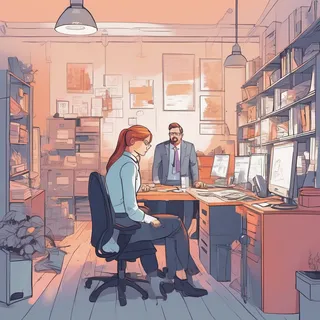Three months into my first senior developer role, I found myself staring at my screen at 2 AM, debugging the same function for the fourth consecutive hour. The code wasn't particularly complex, but my brain felt like it was running through molasses. When my alarm went off six hours later, the thought of opening my laptop made my stomach clench.
That's when I realized I wasn't just tired - I was burning out.
Developer burnout isn't just about working too many hours or dealing with difficult stakeholders. It's a systematic erosion of the passion, creativity, and problem-solving joy that drew us to coding in the first place. If you're reading this at 1 AM wondering if your love for development is permanently broken, you're not alone - and more importantly, it's fixable.
The Subtle Signs That Sneak Up on You
Burnout rarely announces itself with flashing red warnings. Instead, it creeps in gradually, disguising itself as temporary stress or a "rough patch." Here's what to watch for:
The Passion Leak
You stop learning new things. That tutorial you bookmarked three weeks ago? Still sitting there. New framework releases don't excite you anymore - they just feel like more work piling up.
Code reviews become battles. Every suggestion feels like criticism. You find yourself defending implementation choices more aggressively than the situation warrants.
Side projects gather dust. Remember that personal project that had you coding until midnight because you were genuinely excited? When's the last time you touched it?
The Physical Manifestations
Your sleep patterns are chaos. Either you can't fall asleep because your mind won't stop racing through tomorrow's tasks, or you're exhausted but restless sleep leaves you feeling drained.
Small tasks feel monumental. Writing a simple function that would normally take 20 minutes now feels like climbing Everest. You find yourself procrastinating on things you know how to do.
You're constantly fighting something. Headaches, back pain, tension in your shoulders, stomach issues - your body is trying to tell you something.
The Emotional Indicators
Imposter syndrome becomes your constant companion. Everyone else seems to have it figured out while you're just barely keeping your head above water. Every meeting feels like you're about to be exposed as incompetent.
Cynicism replaces curiosity. "This will never work" becomes your default response to new initiatives. You catch yourself rolling your eyes more often than you'd like to admit.
Work relationships suffer. You're shorter in Slack conversations, skip optional team activities, and find yourself increasingly isolated from colleagues who used to be friends.
Why Developers Are Particularly Vulnerable
Our industry has some unique factors that make burnout more likely:
The Perfectionist's Paradise
Code either works or it doesn't. This binary nature can create an unhealthy perfectionist mindset where anything less than flawless feels like failure. We spend hours chasing that elusive "perfect" solution when "good enough" would solve the actual problem.
The Always-On Culture
Technology moves fast, and there's constant pressure to stay current. Between learning new frameworks, keeping up with industry trends, and managing the fear of becoming obsolete, the learning never stops. That's exciting until it becomes exhausting.
The Isolation Factor
Much of our work happens in isolation, staring at screens and thinking through complex problems alone. While some of us thrive in this environment, it can also make it harder to recognize when we're struggling or to reach out for help.
The Crunch Culture Legacy
Despite industry improvements, many organizations still treat overtime as a badge of honor rather than a process failure. "Crunch time" becomes the norm instead of the exception, and sustainable pace becomes a foreign concept.
The Recovery Roadmap
If you're recognizing yourself in these patterns, take a breath. Burnout isn't a character flaw or a sign of weakness - it's your system's way of saying something needs to change. Here's how to start that change:
Immediate Interventions
Take actual time off. Not "I'll check email once a day" time off. Real, disconnected, let-someone-else-handle-it time off. Even if it's just a long weekend, your brain needs space to reset.
Audit your commitments. List everything on your plate - work projects, side hustles, open source contributions, learning goals. Then ruthlessly prioritize. You can't do everything well when you're running on empty.
Reconnect with why you started coding. What problem did you first solve with code that made you think "this is amazing"? Can you recreate that feeling with a small, fun project?
Medium-Term Strategies
Establish non-negotiable boundaries. If you're working past 6 PM regularly, something needs to change. Whether it's workload, processes, or expectations, identify what's driving the unsustainable pace.
Diversify your identity. You're not just a developer - you're a whole person with interests, relationships, and value beyond your ability to write clean code. Invest time in non-technical activities that bring you joy.
Build your support network. Find your people - whether that's a local developer meetup, online communities, or just colleagues who understand the struggle. Isolation amplifies burnout; connection dilutes it.
Practice saying no. To additional features, unrealistic timelines, and commitments that don't align with your priorities. Every yes to something you don't have capacity for is a no to your wellbeing.
Long-Term Sustainability
Reframe failure as learning. That bug that took you three days to find? You now know three ways that approach doesn't work. The feature that got scrapped? You gained experience with the technology and process.
Invest in systems thinking. Instead of working harder, work on making the work easier. Automate repetitive tasks, improve documentation, refactor brittle code. Your future self will thank you.
Regular retrospectives on your career. Schedule monthly check-ins with yourself. What's energizing you? What's draining you? What small adjustments could improve your day-to-day experience?
When Professional Help Makes Sense
Sometimes burnout indicates deeper issues that require professional support. Consider talking to a therapist if:
- Sleep problems persist despite lifestyle changes
- You're having thoughts of self-harm or feeling hopeless
- Anxiety or depression interferes with daily functioning
- Substance use increases as a coping mechanism
- Relationships suffer significantly
Mental health professionals who understand the tech industry can provide tools and perspectives that general stress management can't address.
Building Burnout Resistance
Once you've addressed immediate burnout symptoms, focus on building resilience for the long haul:
Sustainable Learning Practices
Instead of trying to learn every new technology, focus on foundational concepts that transfer across tools. Deep knowledge of principles like data structures, design patterns, and system architecture will serve you better than surface-level familiarity with a dozen frameworks.
Energy Management Over Time Management
You have finite mental energy each day. Tackle your most challenging problems when your energy is highest, typically first thing in the morning. Save routine tasks for when your cognitive load is lower.
Cultivate Technical Leadership Skills
As you grow in your career, your value increasingly comes from helping others solve problems, not just solving them yourself. Mentoring, code reviews, and architectural decisions become more important than individual contributor heroics.
The Path Forward
Burnout recovery isn't linear. You'll have good days and setbacks, moments of clarity and periods of confusion. That's normal and expected.
The goal isn't to become immune to stress or challenges - it's to build sustainable practices that help you navigate the inevitable ups and downs of a development career. When you find yourself loving code again, when you're curious about new technologies instead of overwhelmed by them, when work challenges energize rather than drain you - that's when you know you're on the right track.
Your relationship with development can be repaired and strengthened. The passion that brought you to coding initially is still there, waiting to be rediscovered. Sometimes it just needs a little space to breathe.
What's one small step you can take today to move away from burnout and back toward the joy of building something meaningful? Your future self - the one who remembers why coding is amazing - is counting on your current self to make that choice.





